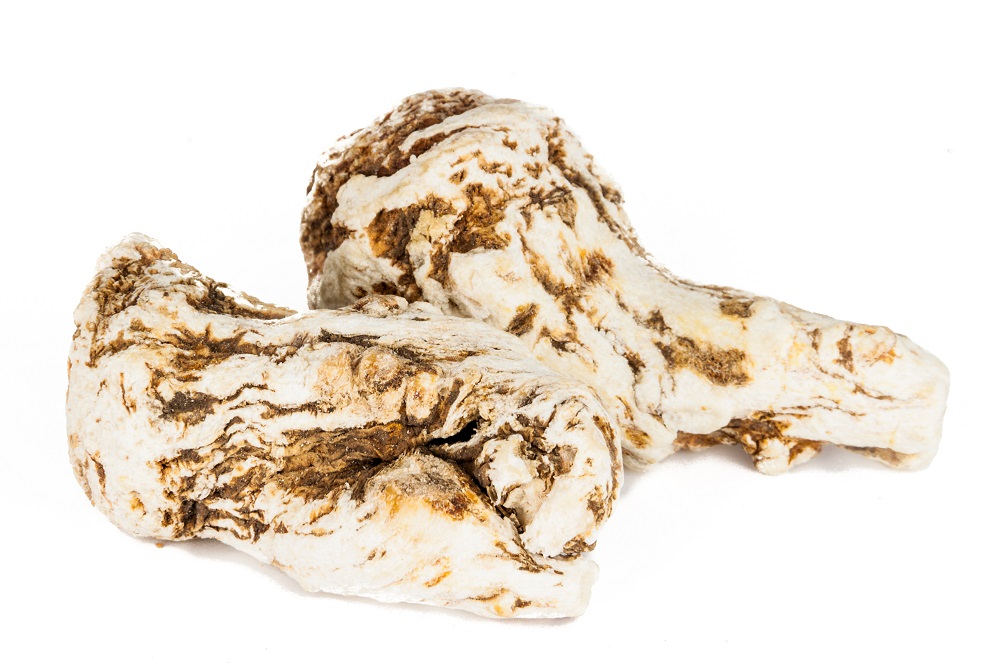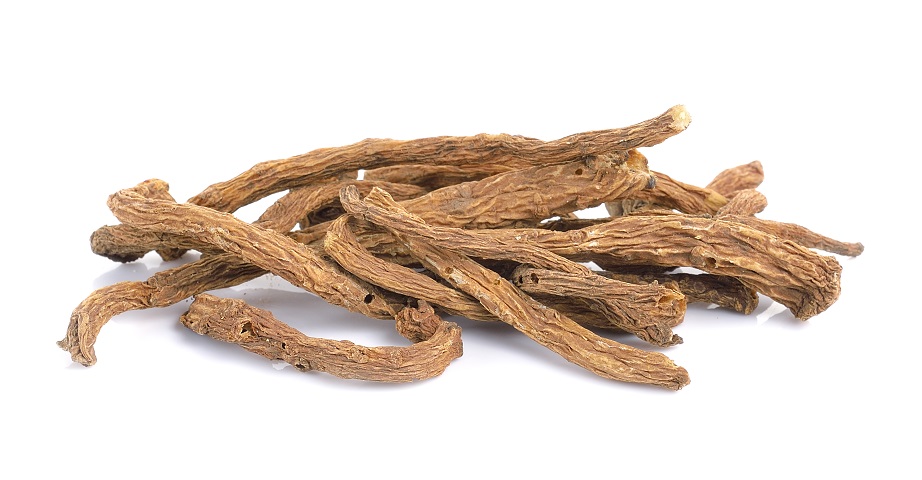Angelica sinensis - properties of female ginseng

Angelica sinensis is a plant growing primarily in Asian high mountain areas, which has been used for thousands of years in traditional Chinese medicine. This herb is used as a remedy for many different ailments, primarily related to the female hormonal balance. However, the plant can also have a positive effect on the work of the digestive or nervous system. What does Angelica sinensis help for and when is it worth using? How to dose dong quai, and when is it better to abandon the use of plant extract?
Summary
What is an Angelica sinensis?
Angelica sinensis, also known as dong quai (from lat. Angelica sinensis) is a plant used for thousands of years in the area of present-day Asia, which can be found primarily in China, Japan and Korea. It is a natural herb belonging to the species of apiaceae plants, which can be found primarily in humid and cool high mountain regions.
The Angelica sinensis reaches a height of about 1.5 meters. It has a strongly branched root, and the white and small flowers of the plant are arranged in canopy inflorescences. The dong quai is a herb that has a pleasant smell, and its young shoots and seeds are often used in the kitchen as a spice. The root of the Angelica sinensis has been used for thousands of years in traditional far-eastern medicine, and its potential, valuable properties are increasingly the object of research of modern researchers and are appreciated in various parts of the world, among others in European countries.
Angelica sinensis - nutrients
The dong quai is a wealth of active substances - nearly 70 different, valuable compounds have been detected in the plant. The Angelica sinensis contains ingredients such as:
- furocoumarins,
- coumarins,
- polysaccharides,
- organic acids,
- flavonoids,
- antioxidants,
- phytoestrogens, and the most important of them - ligustilide,
- phytosterols,
- essential oils,
- minerals, among others magnesium and iron,
- vitamins, such as vitamin E, folic acid or vitamin B12.
Traditional uses of Angelica sinensis
In traditional Chinese medicine, the Angelica sinensis has been used for many thousands of years. Asians recognize that the plant can positively affect the adaptation of the body to adverse environmental conditions, and can also strengthen the body's immunity and the work of the nervous system. Moreover, according to the traditional use of the dong quai, the plant can have a beneficial effect on blood pressure, as well as on female ailments accompanying menopause. It can also relieve symptoms associated with painful menstrual periods and stimulate mental abilities.
Interestingly, according to traditional Chinese medicine, each part of the root of the plant can be distinguished by different properties. The whole root (quan dong quai) can favorably affect blood flow, while the root head (dong quai tou) can inhibit bleeding. The main part of the root, without head and tails (dong quai shen) can enrich the blood without improving its flow, while the dilated roots (dong quai wei) can inhibit blood clotting. The role of the fine, hairy roots of the Angelica sinensis is to strengthen blood flow.
In Europe, the dong quai was appreciated already in the middle ages - monks recommended chewing the roots of the Angelica sinensis in order to improve health and achieve longevity. For many years, the herb was surrounded by reverence and mystery, being the basic ingredient of numerous potions and medicines used to treat various ailments. Because one legend says that during the plague epidemic, the Archangel Gabriel descended to Earth and recommended the use of the Angelica sinensis as a medicine to combat the plague, the Latin name of the plant derives from the word "archangel", and the Angelica sinensis to this day is often referred to as "angel herb".
Angelica sinensis - properties
The Angelica sinensis is often called female ginseng, which is associated with the presence in the root of the plant of valuable phytoestrogens, including ligustilide, which can have loosening properties. Thus, the dong quai can be used to relieve premenstrual syndrome (PMS), as well as to combat painful cramps during menstruation. In addition, the use of the Angelica sinensis can be a support among women struggling with nagging ailments associated with the period of menopause - the root can relieve hot flashes, as well as irritability occurring during menopause. Moreover, it can provide optimal vaginal hydration and reduce hormonal imbalances. The Angelica sinensis can have an anesthetic and sedative effect, in addition, it can contribute to the normalization of the menstrual cycle.
As if that were not enough, the dong quai can also support the work of the circulatory system - the plant has anticoagulant properties, dilates blood vessels and improves blood flow. Thanks to the presence of vitamin B12 and folic acid, the Angelica sinensis root extract can also reduce and alleviate the symptoms of anemia. In addition, the female ginseng can have a positive effect on the functioning of the nervous system and the immune system. The Angelica sinensis root extract can also relax the smooth muscles of the digestive tract and relax the intestines, and thus improve the digestive system, eliminate constipation and relieve abdominal pain.
In addition, the dong quai can exhibit hepatoprotective, choleretic and diuretic properties, and aqueous and ethanol extracts of the Angelica sinensis can reduce fat storage in the subcutaneous tissue.
Recent research suggests that the Angelica sinensis may have therapeutic potential during ischemic brain stroke and during convalescence, which is due to the fact that the plant can have anti-inflammatory and antioxidant effects. In addition, the dong quai can counteract platelet aggregation, which can have a positive effect on neurological function.
Available data from in vivo studies also suggest that the Angelica sinensis in front of another Chinese plant, which is an Astralagus membranous, may contribute to slowing the progression of diabetic nephropathy, as well as to reduce the amount of protein in the urine and inhibit glycogen deposition and improve kidney function. The Angelica sinensis can also have a positive effect on mood and well-being, alleviating the symptoms of a depressed mood.

Angelica sinensis - how to use?
In Poland, the Angelica sinensis is most often available in a powdered form intended for brewing, or in the form of capsules for oral use.
The drink from the Angelica sinensis is prepared just like tea, however, in the case of herbs, the brewing time should be significantly extended. To prepare the tea from the Angelica sinensis, pour about 2 teaspoons of the powdered plant into the dish, and then pour the powder with hot, but not boiling, water. After pouring herbs, the dish should be tightly covered and left for 20-30 minutes. The preparation can be consumed 2-3 times a day, however, it is not recommended to take the Angelica sinenis during menstruation. So it is best to start using the dietary supplement immediately after the end of menstruation and continue every day until ovulation, and then take a break, lasting until the end of the next period.
The powdered form of the Angelica sinensis can also be consumed directly from a teaspoon, without the need for brewing. Then the method of intake is similar to that of the infusion - it is recommended to use the female ginseng powder 2-3 times a day.
The female ginseng in the form of capsules intended for oral consumption should be used in accordance with the manufacturer's recommendation. Most often, it is recommended to include 1-2 capsules of the preparation in the daily menu.
Angelica sinensis - side effects and contraindications
Abuse of the Angelica sinensis can cause disorders of the digestive system and contribute to the occurrence of diarrhea, as well as vomiting or nausea. In addition, a common side effect associated with taking the plant is sensitization of the skin to the sun's rays. Therefore, when using the femal ginseng, it is worth using creams with a UV filter to reduce the risk of skin discoloration and sunburn.
The Angelica sinensis is a herb that is usually well tolerated in general use, but not everyone can use from its health-promoting properties. The dong quai is not recommended for people who use anticoagulants drugs or pharmaceuticals that inhibit platelet aggregation, as it may increase the risk of bleeding. In addition, it is not recommended to take the female ginseng by people using oral contraception or hormone replacement therapy.
In addition, people allergic to apiaceae plants, such as carrots or celery, should abandon to use preparations containing the Angelica sinensis, because the dong quai can cause allergic reactions.

